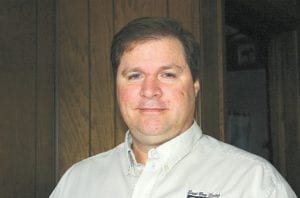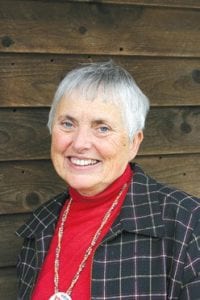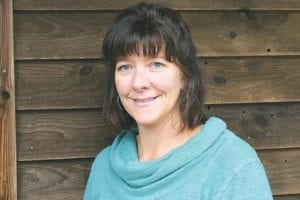Andrew Warren is number three of seven kids. He grew up on a dairy farm in New York State. He attended public schools through seventh grade, then a private school where his father worked as an administrator. He earned a bachelor of science in aviation technology. His first visit to Cook County was in 1988 when he came to work here as a trail guide. He met his future wife, Susan, that year and they eventually married and honeymooned in Cook County. After working in Russia for 10 years, the family decided to make Cook County their home. Theymoved to Colvill in 2002. Warren first worked as manager at Naniboujou Resort and is now the manager of East Bay Suites in Grand Marais.

This week the Cook County News-Herald met with candidates for the school board of School District 166 to hear some of their thoughts about operations at ISD 166. With state budget cuts, declining enrollment, and a proposed operating levy referendum on the school district’s plate, these questions barely scratch the surface of the many issues school board members face.
Visit with the candidates yourself to ask your own questions about matters important to you. To hear more of the candidates’ opinions, tune in to a live candidate forum hosted by our news partners, WTIP community radio on Thursday, Oct. 7 from 6:00 – 7:30 p.m. Tune your dial to 90.7 FM, 91.7 Gunflint Trail, or 90.1 Grand Portage.
The candidates are:
Q How do you set your priorities for budget cuts when everything is important?
Andrew Warren: I thought you’d ask a question like this. I don’t know exactly what I’d cut. Everything is dear to someone. In the school I grew up in we had a choir and a swim team—things we don’t have here. As a community, we have already decided on programs based on the funding we do have. For a variety of reasons we are losing funding, so we need to look at our list again. I like the vision of the school—respect and success. We need to keep that in mind, to look at what is going to give each kid the opportunity to reach their full potential. The school needs to help kids prepare for the future—whether that is as a professional or a logger, a chef or a business owner. So to me, that means a classical education—reading, writing and mathematics.

Deb White and her husband, Doug Seim, moved to Cook County 28 years ago. They are property and business owners in the county and have had two children graduate from Cook County High School. White has a Bachelor of Arts degree from the University of Wisconsin- Madison. White’s employment in the county has included working as “Think Tank Time” coordinator and post-secondary preparation program administrator and tutor at ISD 166, serving as Cook County Community Education youth services coordinator and as Cook County Kids Plus coordinator. She also worked as the Grand Portage Reservation Tribal Council academic coordinator. White now works with her husband in their business, Arktikos Custom Builders.
I know that there are tons of contracts based on state statutes and education unions, so I don’t really have the knowledge I need yet, but my core priorities are reading, writing and math. My direction would come from the parents and the community—I would set priorities based on that.

Mary Sanders and her husband, Doug, both grew up in Minnesota and attended public schools. They met at the University of MN-Duluth. Mary Sanders received a nursing degree from St. Luke’s School of Nursing. After graduating from Aquinas College in Michigan, she had a varied career as a realtor and a refugee resettlement manager. Cook County always was their favorite destination while they were raising their family and in 1999 they moved to the place they have always thought of as “home.” Sanders said volunteering for church and school has been a major part of her life.
Deb White: I believe that the school is a community. It’s the people there that help the kids learn. They need to consolidate administration in some way. Or better yet, we might have to work with the charter schools. We could share the cost of teacher workshops; maybe we can buy copy paper in bulk together. For the sake of all our kids, everybody has to work together.
Mary Sanders: All cuts are painful. How do you choose between a student who needs vo-tech training and one who needs college prep? Then you have the little ones—research shows that if a child is not reading up to grade level by third grade, they’ll likely be behind the rest of their life. We need to reach these children in early childhood. Right now we have an early childhood educator, thanks to a grant and limited school funds. Do we cut her? Do we cut the electives like welding? Or the college prep courses? These are the things that give kids motivation and sense of worth. Athletics—that’s what gets some kids through school—do we cut that? We struggle with this. We try to see which cut is least painful, to save the things that benefit the most students.

Jeanne Anderson was born and raised in the Bemidji area, in a town smaller than Grand Marais. She attended kindergarten through 12th grade in the same building. Jeanne and her husband, Steve, became Lutsen property owners in 2008. They live in Lutsen with their children, Leif and Malin. Anderson has a Bachelor of Science degree in office administration from Bemidji State and she has over 15 years of experience in office and business administration, including financial reporting, budgeting, and human resources. She worked as Edina Community Education operations manager from 1995 to 1997 and as Sawtooth Elementary School secretary in the 2009 – 2010 school year. She is also the Grand Marais campus PTA secretary.
There are a number of options the school board is looking at, especially if the levy referendum doesn’t pass, such as eliminate athletic spending and co-curricular spending—that is Math Master, Robotics, One-Act Play, etc.; increasing class sizes; decreasing early childhood spending; and eliminating the K-12 counselor. If people want to learn more about the operating levy, they should go to the school district website [www. CookCountySchools.org] or a print copy is available at the district office.
Jeanne Anderson: You have to prioritize. Yes, everything is important, but I think inevitably something comes to the forefront. There is something you can do without—like with our home budget. With school it will be tough—we are pretty lean already.
Q Recently a paraprofessional was suspended for having a pocketknife in his pocket at school. Do you agree with this compliance with the school “no weapon” policy?
Andrew Warren: Everyone knows the rules—or should know the rules—and you bear the consequences of breaking the rules. So, I would agree with the action of following the school’s rules. Frankly this isn’t a matter that should come before the school board, but is a matter for the administration that the school board has hired. But as a parent, I wouldn’t want teachers coming to school with knives.
Deb White: Things have changed. I remember being at the school when a kid forgot a gun in his car. He was going hunting after school. He was suspended. They have to stand firm on this policy. I’m sure it was innocent, but the people who work there have to follow the rules put in place by the district. The rules were put in place because of incidents at other school districts, but we can’t jeopardize or take chances with our kids. These kids are our most important commodity. They are our community.
Mary Sanders: Yes, however, this person was suspended with pay for two days, not suspended for the rest of the year. The bigger issue is regarding the four paraprofessionals that were laid off, which includes this person. They are all good people. Our superintendent did the best she could. The cuts were made for budget reasons. Was the concern about the knife a factor?—I don’t know. We looked at needs and four good people were unfortunately let go.
Jeanne Anderson: I think if the school has clear policies in place and they are accessible to everyone, it is staff responsibility to follow the policies. The policies must be clear and the followthrough consistent.
Q School District 166 meets jointly with the Cook County Board of Commissioners, the City of Grand Marais
and the Grand Portage Reservation Tribal Council
quarterly. Do you believe this is frequent enough?
Andrew Warren: I think that is frequently enough. I definitely support that gathering. Our community is so intertwined with each other—the different school districts and the community need to have meetings to discuss issues of shared concern. I think it’s a great idea.
Deb White: Honestly, from the outside, I can’t really say. If the people who have been participating feel that the issues warrant more frequent communication, then yes. Communication is important—if I have an issue, I can always call [Commissioner] Jan Hall and say, "Here’s what’s up.”
I am more of a hands-on doer than a meeting person who expects others to do the work. An efficient, open meeting with respectful exchange of ideas is great as long as one stays on task.
Mary Sanders: I think these meetings are beneficial. The three month meetings have been working. It’s important that we maintain communication. If county commissioners are discussing something that pertains to the school, they should direct these questions to the school district. There needs to be clarification from the source sometimes. I think communication has improved, the way we interact with other entities—like regarding the 1% sales tax and the community center. We meet in other ways. We should be conscious of communication and not act in a singular manner.
Jeanne Anderson: Not knowing what is discussed at those meetings, I’m not sure if that is the right frequency. I think quarterly would be good, as long as there is an option to meet more often if needed for ongoing issues. The more communication, the better.
Q Do you feel there is adequate communication between ISD 166 and the charter schools? What can be done to improve communications between the schools?
Andrew Warren: Frankly, I don’t know the extent of communication between the schools. I’ve followed the discussion regarding sports sharing. That makes sense; those students will eventually be attending ISD166, unless home schooled or if they pursue other options. Their parents work in this community— they’ll grow up to work and marry someone in this community.
I definitely support communication and sharing, such as sports or things that are too small for charter schools. Obviously, there needs to be participation fees.
Deb White: I’m not sure there needs to be an improvement. If there is a need, I would say just talk to them; get them to the table. If you get an idea—share it. We need to put egos aside and decide what is best for the kids—our kids.
Mary Sanders: I think communication has greatly improved. The schools exist and I accept that. We have been working together. All of the schools are concerned with achievement gaps—in all schools, not just ours. We’ve had discussion on how we can address this. We have also shared programs, like the recent SPARKS have workshop—all of the charter schools were invited. We also have kids from charter schools participating in middle school athletics and activities. This is something we need to continue to do. It’s something we need to do, for all the kids.
Jeanne Anderson: From my experience as elementary school secretary, I felt there was pretty good communication. I would encourage that it stay that way. I think it’s important to have good communication because ultimately the charter school students end up at ISD166 and they are our community members.
Q What would you like to say to voters trying to decide whom to vote for to serve on the ISD 166 school board?
Andrew Warren: I guess I’d talk about myself so people know what they would be getting. I have experience in managing a business here in town. I would use that experience to make our school successful, to make it live up to the vision of respect and success for all. I’m a very commonsense candidate. I have three kids still in the school district and I think that gives me a good perspective of what’s happening in the school and how students see the school. I’m not running with an agenda to change a bunch of stuff. My motivation is to be a voice of the parents, community members, and employers of our community. I think I’d bring a good balance to the school board.
Deb White: I was recently asked, "Is it true you are running for school board?" The person was incredulous. They asked, "Why would you want to do that?" I’m running because I really care about this school and I really care about our kids.
And I have the time to try to resolve problems. Admittedly, no one will ever be 100% happy with the school board, but I’m committed to seeing that all of our kids have the great education that my children did at ISD166.
Mary Sanders: I would say vote for someone who cares about students and their chances for success. We want someone who cares about keeping the excellence we have in our school.
I think experience would benefit in this situation—I had a lot to learn in my first term eight years ago and I appreciate being given the opportunity to serve. I’ve been blessed with the ability to give back.
My most significant accomplishment was to facilitate the formation of the mission statement: Success for each, Respect for all. I worked with many good people—parent Jeff Kern, community member Marcia Cushmore, teacher Kaye Tavernier and many others in the community. I’m really proud of the mission statement. I’m a person who wants to hear from the community about what is important to them and I think this demonstrates that I care what people have to say.
Jeanne Anderson: My message to voters would first be to encourage them to vote! And I would encourage voters to go with the candidates they feel best represent their beliefs. I admire anyone willing to run. I don’t think we can go wrong with anyone willing to give time and energy to our children.


Loading Comments